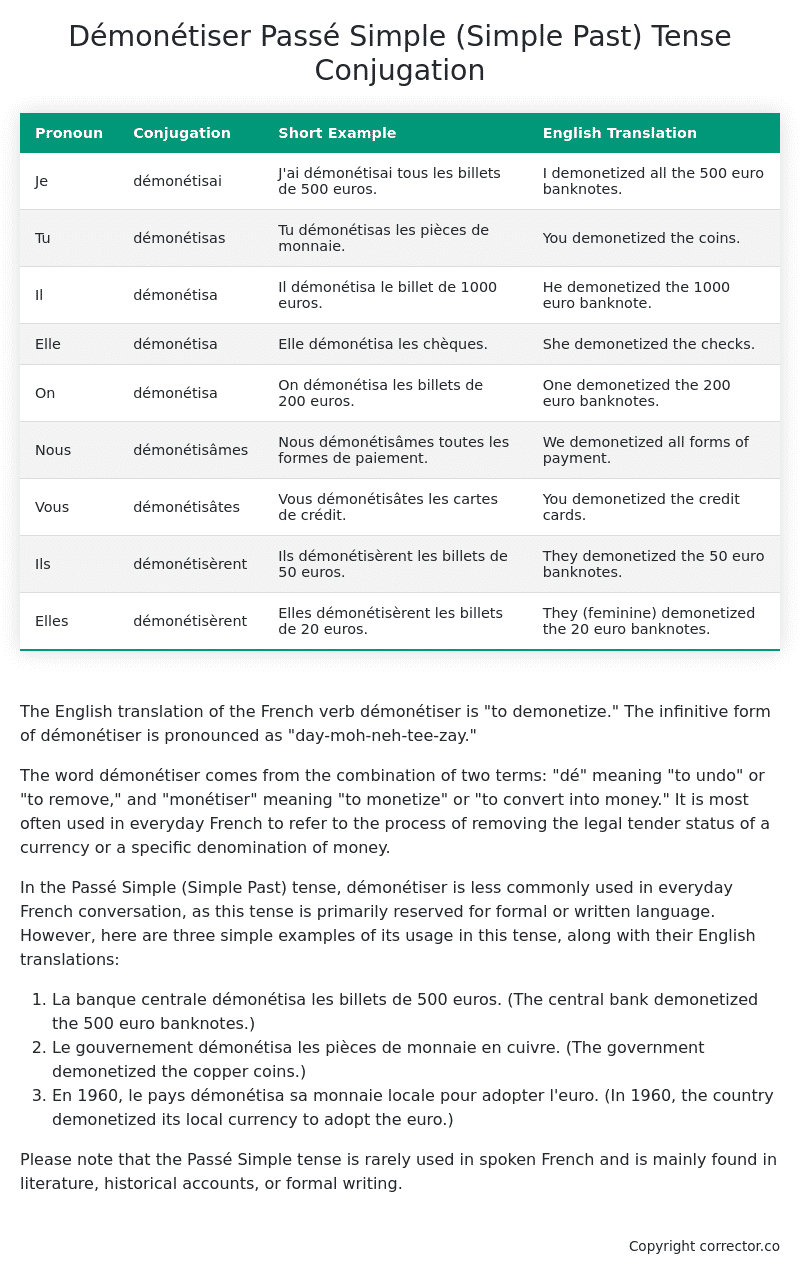Passé Simple (Simple Past) Tense Conjugation of the French Verb démonétiser
Introduction to the verb démonétiser
The English translation of the French verb démonétiser is “to demonetize.” The infinitive form of démonétiser is pronounced as “day-moh-neh-tee-zay.”
The word démonétiser comes from the combination of two terms: “dé” meaning “to undo” or “to remove,” and “monétiser” meaning “to monetize” or “to convert into money.” It is most often used in everyday French to refer to the process of removing the legal tender status of a currency or a specific denomination of money.
In the Passé Simple (Simple Past) tense, démonétiser is less commonly used in everyday French conversation, as this tense is primarily reserved for formal or written language. However, here are three simple examples of its usage in this tense, along with their English translations:
- La banque centrale démonétisa les billets de 500 euros. (The central bank demonetized the 500 euro banknotes.)
- Le gouvernement démonétisa les pièces de monnaie en cuivre. (The government demonetized the copper coins.)
- En 1960, le pays démonétisa sa monnaie locale pour adopter l’euro. (In 1960, the country demonetized its local currency to adopt the euro.)
Please note that the Passé Simple tense is rarely used in spoken French and is mainly found in literature, historical accounts, or formal writing.
Table of the Passé Simple (Simple Past) Tense Conjugation of démonétiser
| Pronoun | Conjugation | Short Example | English Translation |
|---|---|---|---|
| Je | démonétisai | J’ai démonétisai tous les billets de 500 euros. | I demonetized all the 500 euro banknotes. |
| Tu | démonétisas | Tu démonétisas les pièces de monnaie. | You demonetized the coins. |
| Il | démonétisa | Il démonétisa le billet de 1000 euros. | He demonetized the 1000 euro banknote. |
| Elle | démonétisa | Elle démonétisa les chèques. | She demonetized the checks. |
| On | démonétisa | On démonétisa les billets de 200 euros. | One demonetized the 200 euro banknotes. |
| Nous | démonétisâmes | Nous démonétisâmes toutes les formes de paiement. | We demonetized all forms of payment. |
| Vous | démonétisâtes | Vous démonétisâtes les cartes de crédit. | You demonetized the credit cards. |
| Ils | démonétisèrent | Ils démonétisèrent les billets de 50 euros. | They demonetized the 50 euro banknotes. |
| Elles | démonétisèrent | Elles démonétisèrent les billets de 20 euros. | They (feminine) demonetized the 20 euro banknotes. |
Other Conjugations for Démonétiser.
Le Present (Present Tense) Conjugation of the French Verb démonétiser
Imparfait (Imperfect) Tense Conjugation of the French Verb démonétiser
Passé Simple (Simple Past) Tense Conjugation of the French Verb démonétiser (You’re reading it right now!)
Passé Composé (Present Perfect) Tense Conjugation of the French Verb démonétiser
Futur Simple (Simple Future) Tense Conjugation of the French Verb démonétiser
Futur Proche (Near Future) Tense Conjugation of the French Verb démonétiser
Plus-que-parfait (Pluperfect) Tense Conjugation of the French Verb démonétiser
Passé Antérieur (Past Anterior) Tense Conjugation of the French Verb démonétiser
Futur Antérieur (Future Anterior) Tense Conjugation of the French Verb démonétiser
Subjonctif Présent (Subjunctive Present) Tense Conjugation of the French Verb démonétiser
Subjonctif Passé (Subjunctive Past) Tense Conjugation of the French Verb démonétiser
Subjonctif Imparfait (Subjunctive Imperfect) Tense Conjugation of the French Verb démonétiser
Conditionnel Présent (Conditional Present) Tense Conjugation of the French Verb démonétiser
Conditionnel Passé (Conditional Past) Tense Conjugation of the French Verb démonétiser
Conditionnel Passé II (Conditional Past II) Tense Conjugation of the French Verb démonétiser
L’impératif Présent (Imperative Present) Tense Conjugation of the French Verb démonétiser
L’impératif Passé (Imperative Past) Tense Conjugation of the French Verb démonétiser
L’infinitif Présent (Infinitive Present) Tense Conjugation of the French Verb démonétiser
L’infinitif Passé (Infinitive Past) Tense Conjugation of the French Verb démonétiser
Le Participe Présent (Present Participle) Tense Conjugation of the French Verb démonétiser
Le Participe Passé (Past Participle) Tense Conjugation of the French Verb démonétiser
Struggling with French verbs or the language in general? Why not use our free French Grammar Checker – no registration required!
Get a FREE Download Study Sheet of this Conjugation 🔥
Simply right click the image below, click “save image” and get your free reference for the démonétiser Passé Simple tense conjugation!

Démonétiser – About the French Passé Simple (Simple Past) Tense
Formation
Usage
Narration
Historical Context
Interactions with other tenses
Passé Composé
Imparfait
Conditional and Subjunctive
Summary
I hope you enjoyed this article on the verb démonétiser. Still in a learning mood? Check out another TOTALLY random French verb conjugation!


